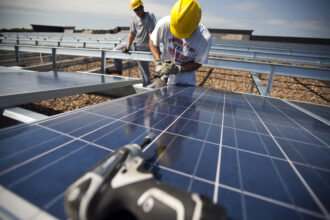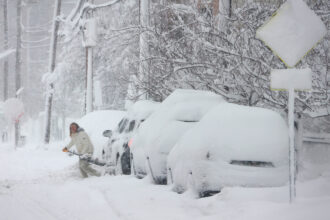EU: Russia Ready for Deeper Emissions Cut (AFP)
Russia is ready to cut its greenhouse gas emissions by 20 to 25 percent by 2020 from 1990 levels, raising its target from 15 percent just weeks ahead of a UN climate summit, the head of the European Commission says.
Power Plant-Only Climate Bill Possible in US Senate (GreenWire)
A bipartisan faction of Senate moderates is examining the idea of passing a bill that deals only with the heat-trapping emissions from power plants, saying it would have a better chance of passing.
California Restricts Energy-Guzzling TVs (San Francisco Chronicle)
California regulators brought the state’s pioneering greenhouse gas reduction efforts into the living room, approving limits on how much energy TVs can consume, citing the increased use of power-guzzling flat-panel sets.
Degraded Peatlands Unleash Vast Amounts of Carbon (Washington Post)
A vast layer of coal-black peat, once locked away but now drying and disintegrating as swamps are shorn of trees, has helped make Indonesia the world’s third-biggest emitter of greenhouse gases.
Copenhagen Still ‘Golden Opportunity’ for Carbon Offset Reform (Reuters)
U.N. summit in Copenhagen next month is unlikely to agree on a new global climate treaty, but carbon market players are urging delegates to seize the opportunity to reform the $33 billion trade in carbon offsets.
India PM Heads to US in Test of Ties with Obama (Reuters)
India’s prime minister and U.S. President Barack Obama meet next week to strengthen ties, with the emerging Asian power increasingly playing a bigger role on global issues such as climate change and trade.
World Bank: Include Indigenous Groups (COP15)
Indigenous peoples carry a "disproportionate share of the burden of climate change effects" and must be included in the climate talks in Copenhagen, World Bank Group President Robert B. Zoellick says.
Obama Uncertain on Attending Summit (Politico)
Trapped between international pressure to curb emissions and a Senate unready to act, the White House is playing coy about the president’s plans for Copenhagen.
Scientists Detail Molecular Basis of Global Warming (Purdue)
A new study on global warming by NASA and Purdue documents how fluorides such as CFC, HFCs and PFCs and sulfur and nitrogen fluorides stand out for their efficiency to trap radiation in the atmospheric window.
Oceans’ Ability to Sequester Carbon Diminishing (Mongabay)
A new study of the oceans’ intake of carbon over the past 250 years finds that oceans’ ability to sequester carbon is struggling to keep-up with ever-growing emissions.
Antarctic Temperature Spike Surprises Climate Researchers (Nature)
A study of ice-core samples finds that East Antarctica is more sensitive than it seemed to global warming.
POET Reduces Cellulosic Ethanol Cost (Green Car Congress)
Over the first year of operations of its pilot-scale cellulosic ethanol plant in South Dakota (earlier post), POET has reduced its per gallon production cost from $4.13 to $2.35, exceeding its expectations.
Will the GOP Nominate a Climate Change Denier in 2012? (Huffington Post)
Of the eight names most frequently mentioned as GOP candidates for president in 2012, five outright deny or question climate science, and the remaining three are opposed to all meaningful action.
When Behavioral Economics Meets Climate Change (ClimateBiz)
Personal choices have a huge collective impact on the climate crisis. Experts say some simple behavior changes could generate energy savings of 25 to 30 percent over the next five to eight years.
About This Story
Perhaps you noticed: This story, like all the news we publish, is free to read. That’s because Inside Climate News is a 501c3 nonprofit organization. We do not charge a subscription fee, lock our news behind a paywall, or clutter our website with ads. We make our news on climate and the environment freely available to you and anyone who wants it.
That’s not all. We also share our news for free with scores of other media organizations around the country. Many of them can’t afford to do environmental journalism of their own. We’ve built bureaus from coast to coast to report local stories, collaborate with local newsrooms and co-publish articles so that this vital work is shared as widely as possible.
Two of us launched ICN in 2007. Six years later we earned a Pulitzer Prize for National Reporting, and now we run the oldest and largest dedicated climate newsroom in the nation. We tell the story in all its complexity. We hold polluters accountable. We expose environmental injustice. We debunk misinformation. We scrutinize solutions and inspire action.
Donations from readers like you fund every aspect of what we do. If you don’t already, will you support our ongoing work, our reporting on the biggest crisis facing our planet, and help us reach even more readers in more places?
Please take a moment to make a tax-deductible donation. Every one of them makes a difference.
Thank you,











